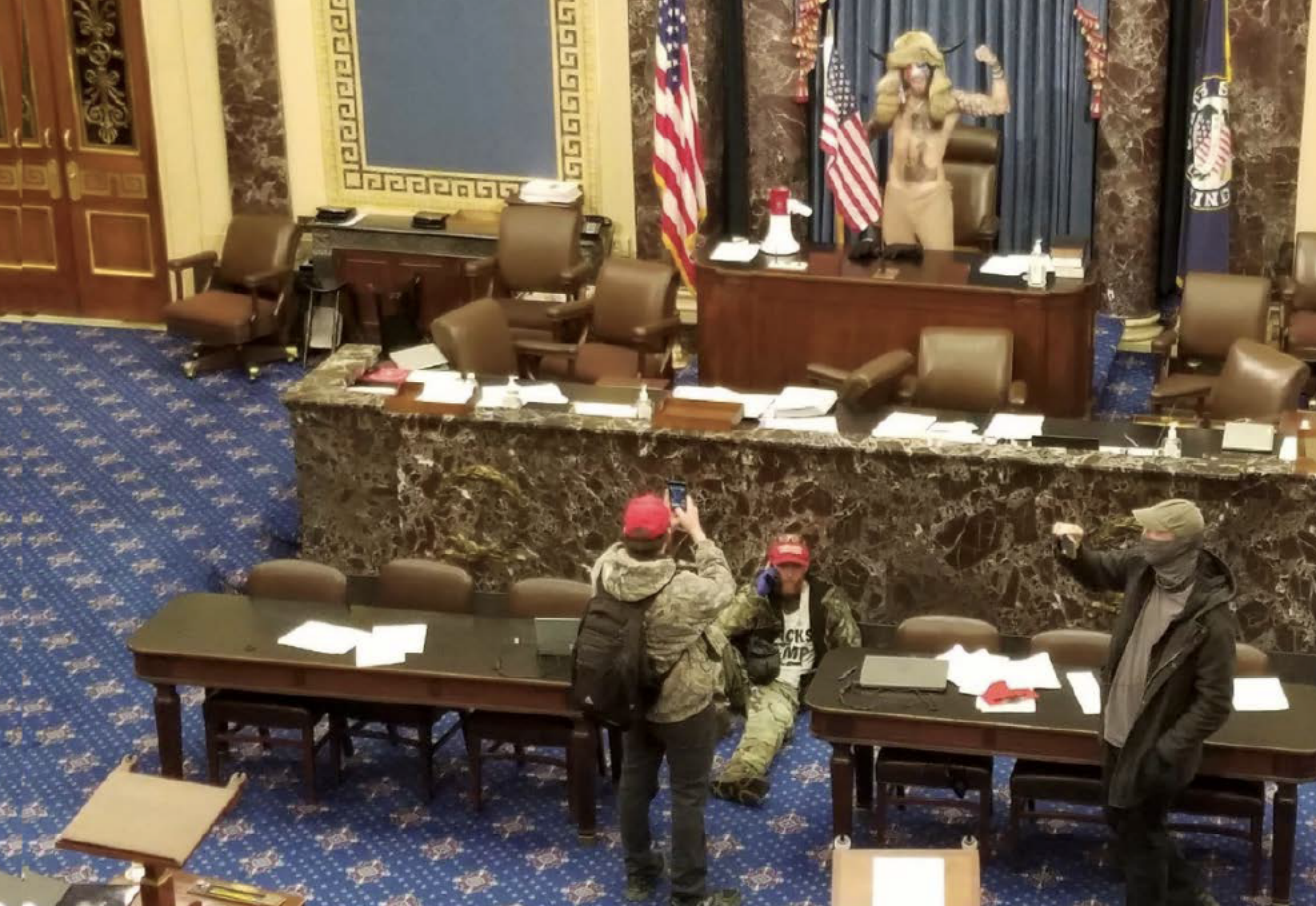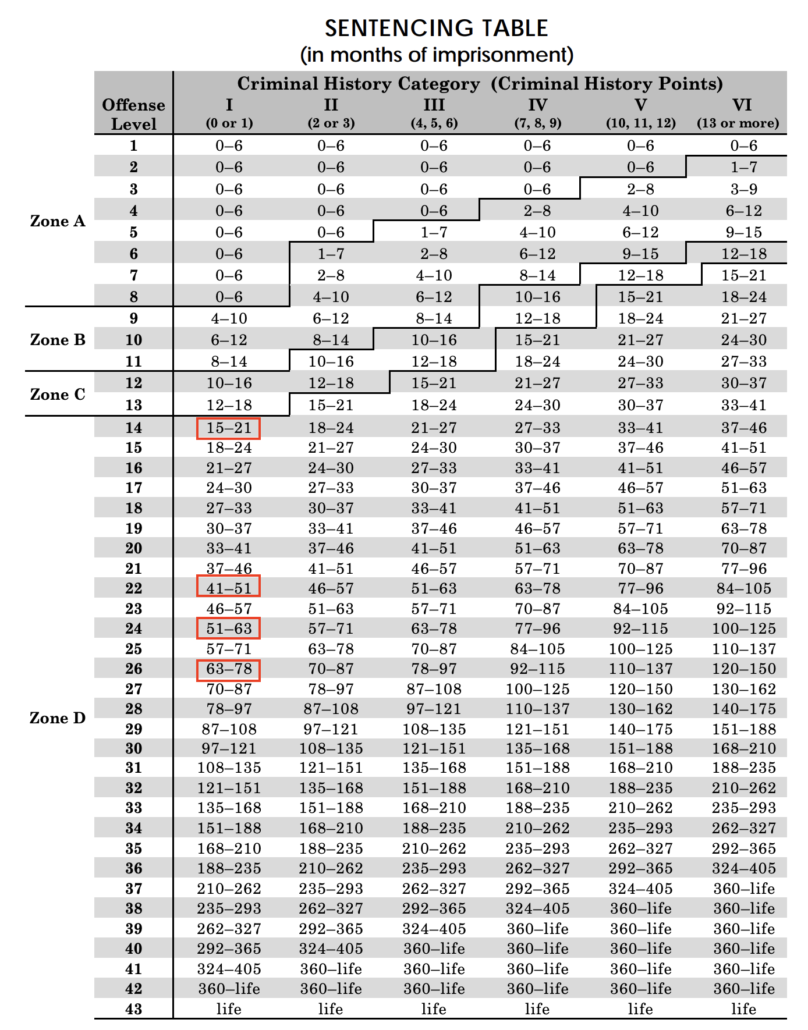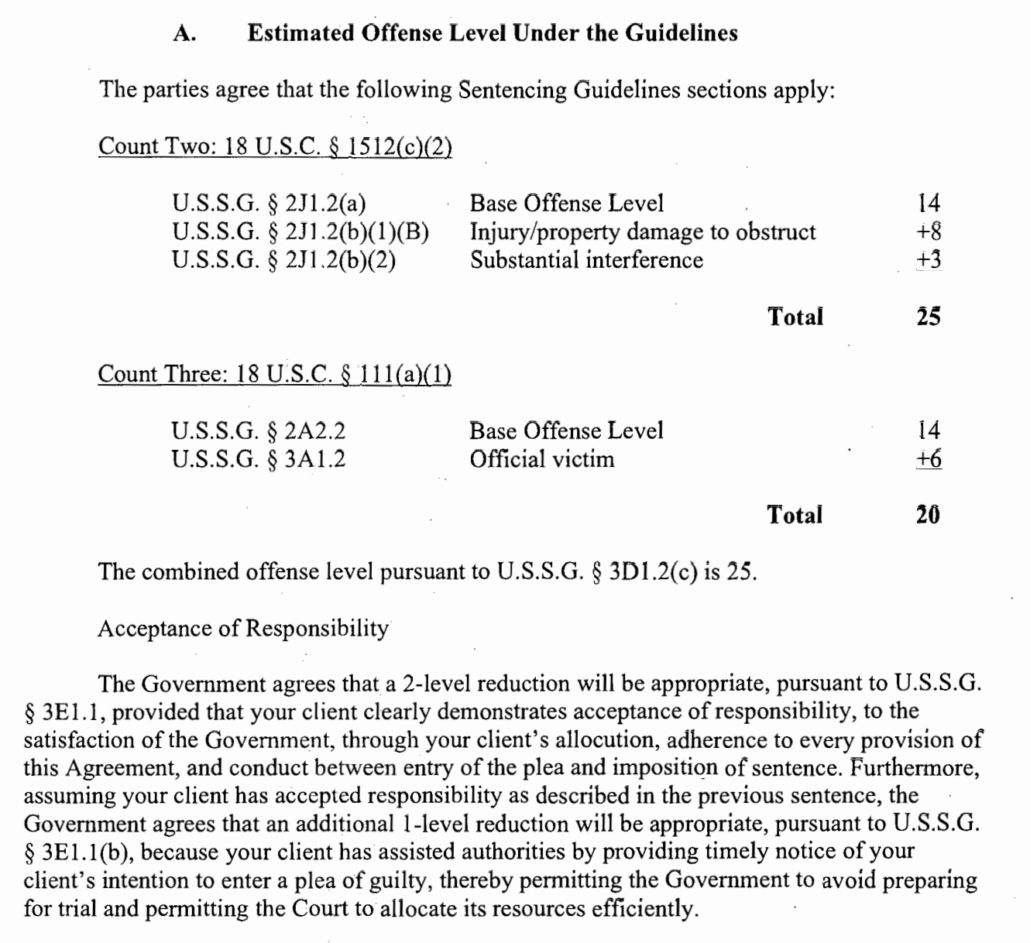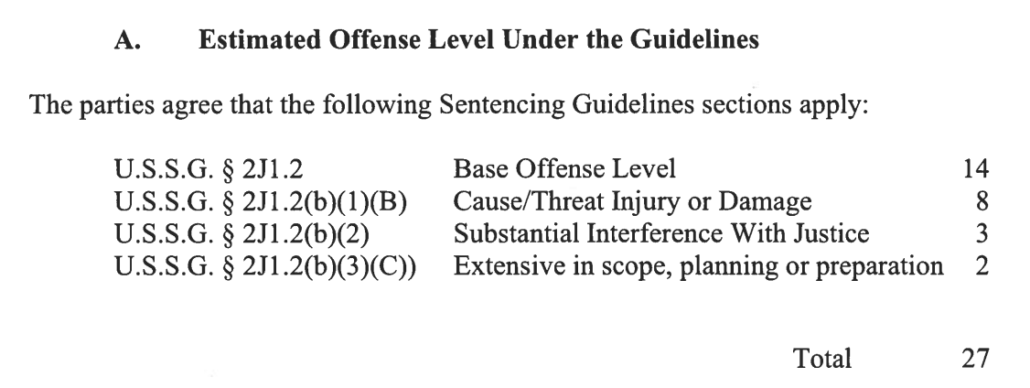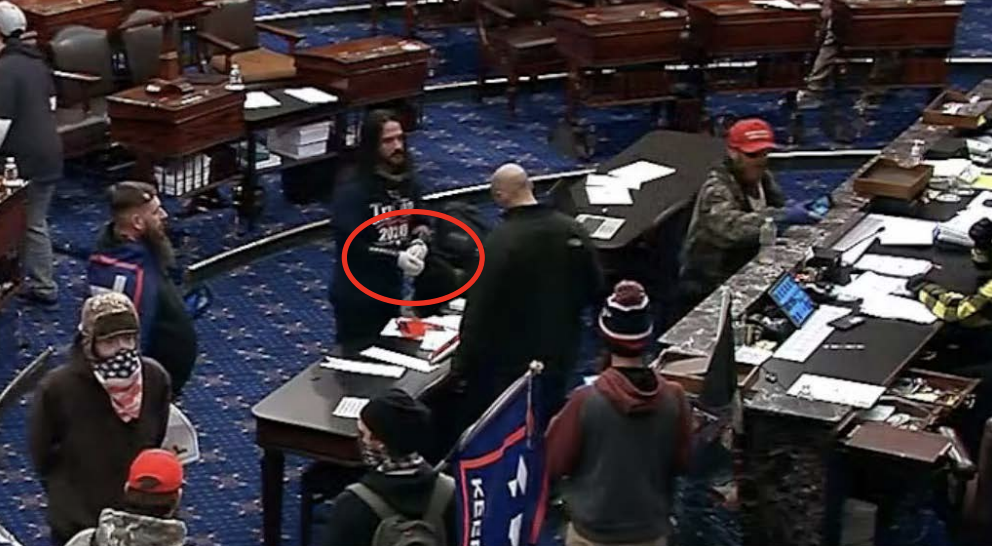How Jacob Chansley Proved Patrick LeDuc Right
I have written repeatedly about how charging January 6 rioters with obstruction provides DOJ a really elegant way of holding people accountable, while providing the flexibility to distinguish between different levels of seriousness (until such time as some judge overturns this application of 18 USC 1512).
A review of what has happened with five men who’ve pled guilty to obstruction so far illustrates not only the range of sentences possible from the same charge, but also the factors DOJ is using to distinguish defendants based on their actions on January 6.
Before I lay out what has happened, first a word of explanation: To get to sentences, the two sides in a plea deal first agree on a “Estimated Offense Level,” then (if someone pleads guilty), knocks a few points (usually 3) off for pleading. That gives a number that gets plugged into the Sentencing Table to figure out the guidelines sentence, in months, based on whether someone has a criminal record.
So in what follows, I’m showing the initial calculation (before the 3 points taken off for pleading guilty), and then showing what the plea agreement says the guidelines will be. In the table, I’ve marked the four different guidelines calculated in the five cases I discuss here (Scott Fairlamb has some criminal background so may get bumped up a level, but the others have no criminal background).
Paul Hodgkins, who traveled alone to bring his Trump flag to the floor of the Senate, pled guilty to obstruction, and went into sentencing facing a 15 to 21-month sentence (and ultimately got an 8-month sentence).
The number you’ll see Patrick LeDuc mention — 14 — in an email below is obtained by knocking 3 points off 17. And the 15-21 months is taken by checking the “0” criminal record column for an offense level of 14.
Scott Fairlamb. who didn’t plan for insurrection but while there punched a cop, pled guilty to obstruction and assault and goes into sentencing facing 41 to 51 months. DOJ has reserved the right to invoke a terrorist enhancement (including in his plea colloquy) that, if Judge Lamberth agreed, could result in a far stiffer sentence, up to 10 years.
Josiah Colt, who planned his trip to DC with two others, came to DC armed, and rappelled onto the Senate floor, pled guilty to obstruction, but faces (before getting credit for cooperation) 51 to 63 months.
Graydon Young, who planned in advance with a militia, entered the Capitol as part of a Stack, and tried to destroy evidence, pled guilty to obstruction, but faces (before getting credit for cooperation) 63 to 78 months. The difference in guideline between him and Colt is not that Colt’s “militia” was disorganized (a couple of guys he met online), but rather that Young tried to destroy evidence. Otherwise, they’re the same.
These four men all pled guilty to the same crime, obstruction of the vote count, but all faced and are facing dramatically different sentences based on the context of what they had done. And for those who deliberately used violence in pursuit of obstruction could face longer sentences, up to 20 years, which happens to be the same sentence that some sedition-related charges carry, but (again, unless judges overturn this application of obstruction) would be far easier to prove to a jury.
Somewhere around 200 January 6 defendants have been charged with obstruction, but among those 200, there’s a great range of actions they took in their alleged effort to prevent the peaceful transfer of power, including:
- How obstructive their actions were (a 3 point enhancement)
- Whether they used violence or threats thereof (an 8 point enhancement)
- Whether they planned in advance to obstruct the vote count (a 2 point enhancement)
- Whether they engaged in further obstruction (a further 2 point enhancement)
- Whether someone did or abetted more than $1,000 in damage to the Capitol (which will likely get a terrorism enhancement)
And this is an issue that will play out in Paul Hodgkins’ effort to appeal his sentence.
According to claims made in court, Hodgkins decided to admit his guilt early on, which led to him being the first person to plead guilty to that obstruction charge. His lawyer at the time was a guy named Patrick LeDuc, a JAG Reserve Officer who learned after he started representing Hodgkins he had to deploy to the Middle East. Immediately after he was sentenced to a below guidelines sentence, per representations a new lawyer has now made, he asked if he could appeal (Friday, Judge Randolph Moss granted his request to extend his time to appeal). What LeDuc said in response will likely be the matter of a legal fight. We do know that on August 21, LeDuc told Hodgkins, “You have no right to appeal the sentenced [sic] pursuant to our plea agreement,” which suggests that at that point, LeDuc understood Hodgkins’ complaint to be with the sentence, not the competence of his representation.
But we know, for sure, that LeDuc told Carolyn Stewart, Hodgkins’ new lawyer, that other January 6 defendants who made it to the Senate floor were going to be charged with more enhancements to the base obstruction charge than Hodgkins.
Here is what you should know. Capitol Hill Defendants found in the Senate are all being offered a felony (same as Paul)(some more than one felony) with an 8 level enhancement (you might consider obtaining a Federal Sentencing manual for your reference). I was able to get the DOJ to agree to only a 3 level enhancement. You ought to know that my plea deal was adopted at the highest level to include the AG of the United States. That meant that my client was at level 14 instead vice level 19. Other Capitol Hill defendant [sic] are looking at 46 months low end. The AG instructed AUSA Sedky to argue for mid range – 18 months. And you would suggest that is evidenced [sic] of malpractice. I would argue that an attorney of 6 months accusing an attorney with over 250 jury trials at both the State and Federal level, and with 30 years of experience is unprofessional on your part.
If you think the plea deal was insufficient, then you ought to know that the United States makes offers with a a [sic] take it or leave it attitude. Everything in the plea deal was boilerplate with one exception that did not bother me. That was a provision that required me to agree that level 14 was good to go and that I would not object to the PSR. I was allowed to argue for a variance under 3553, which was my strategy all along, and the judge did indeed vary 3 levels into ZONE B. Ms. Sedky is a very experienced prosecutor, and the plea deal was arranged over many lengthy phone calls over a period of 3 months. Being the first felony case to be resolved was something that DOJ had to concur in because my case was going to set the precedent for every one to follow and the stakes were high for both sides.
My strategy paid off to Paul’s benefit. No other Federal defendant who is pleading to a felony will get a sentence better than Paul (nearly 250 others) We had a very good judge who understood the issues, and the sentence was a fair reflection of the fats.
LeDuc is obviously furious at being called incompetent (and writing from Qatar where he is also juggling a huge influx of refugees from Afghanistan). But in this passage he describes a lot of the background to the plea deals that was evident to those of us following closely, but for which there had been only off the record confirmation.
I think things may intervene that change DOJ’s plans (particularly if any of the challenges to 1512 are successful). But LeDuc describes that the plan when he was involved was to give Hodgkins a good deal and then use that as the precedent for everyone else. With other judges an 8-month sentence may not actually be the floor, but it is the base level treatment DOJ thinks it will adopt for those charged with felonies.
We’ve seen a few people plead down from felonies to 18 USC 1752, but thus far those people are looking at close to the same sentence as Hodgkins, 6 months, a difference of 2 months and the onerous felony conviction.
One thing LeDuc did say is that other defendants who made it to the Senate floor will face 8 level enhancements. Again, I’m virtually certain there will be others who made it to the Senate that will avoid this treatment.
But yesterday, with Jacob Chansley’s sentence, LeDuc was proven correct: another defendant, with whom Hodgkins stormed the Senate floor, got an 8 point enhancement for doing so.
Note that, as with Fairlamb, the government reserved the right to ask for a terrorist enhancement, though I did not hear AUSA Kimberly Paschall make a record of that in yesterday’s plea hearing, as AUSA Leslie Goemaat did in Fairlamb’s plea hearing.
To be sure, Chansley’s Statement of Offense includes multiple things that weren’t present with Hodgkins (nor will they be present for some others who made it to the Senate floor). According to his sworn Statement of Offense, Chansley defied orders from Officer KR four different times, and made public and written comments while in the Senate that might be deemed a threat, including to Mike Pence personally.
11. At approximately 2:16 p.m., the defendant and other rioters ascended the stairs to the second floor to the Senate side of the U.S. Capitol building. In a clearing on the second floor, the defendant and other rioters were met by a line of U.S. Capitol Police officers, instructing them to peacefully leave the building. The defendant challenged U.S. Capitol Police Officer K.R. to let them pass, ultimately using his bullhorn to rile up the crowd and demand that lawmakers be brought out.
12. Instead of obeying the instructions of the U.S. Capitol Police to leave the building, the defendant traversed another staircase to the third floor of the Senate side of the U.S. Capitol building. At approximately 2:52 p.m., the defendant entered the Gallery of the Senate alone. The defendant then proceeded to scream obscenities in the Gallery, while other rioters flooded the Chamber below.
13. The defendant then left the Gallery and proceeded down a staircase in an attempt to gain entry to the Senate floor. There, the defendant once again encountered Officer K.R., who once again asked him to leave the building. The defendant insisted that others were already on the Senate floor and he was going to join them. Officer K.R. then followed the defendant on to the Senate floor.
14. The defendant then scaled the Senate dais, taking the seat that Vice President Mike Pence had occupied less than an hour before. The defendant proceeded to take pictures of himself on the dais and refused to vacate the seat when Officer K.R., the lone law enforcement officer in the Chamber at the time, asked him to do so. Instead, the defendant stated that “Mike Pence is a fucking traitor” and wrote a note on available paper on the dais, stating “It’s Only A Matter of Time. Justice Is Coming!”
15. After Officer K.R. again asked the defendant to vacate the seat, the defendant remained, calling other rioters up to the dais and leading them in an incantation over his bullhorn, which included giving thanks for the opportunity “to allow us to send a message to all the tyrants, the communists, and the globalists, that this is our nation, not theirs, that we will not allow America, the American way of the United States of America to go down.” The defendant went on to say “[t]hank you for allowing the United States to be reborn. Thank you for allowing us to get rid of the communists, the globalists, and the traitors within our government.”
16. Finally, at approximately 3:09 p.m., other law enforcement officers arrived to support Officer K.R., and cleared the defendant and other rioters from the Chamber. [my emphasis]
While it’s a puzzle to compare who posed more of a threat, Scott Fairlamb or Jacob Chansley, DOJ is treating both as people who deliberately tried to prevent the vote count by using violence or threats thereof. And because of that, DOJ has gotten their attorneys to agree, they should face a sentence more than twice as long as Hodgkins faced.
And that’s precisely what Patrick LeDuc told Hodgkins’ new lawyer would happen.
Update: I’ve corrected that these are the only five men who’ve pled guilty to obstruction. Some other Oath Keepers also did.

